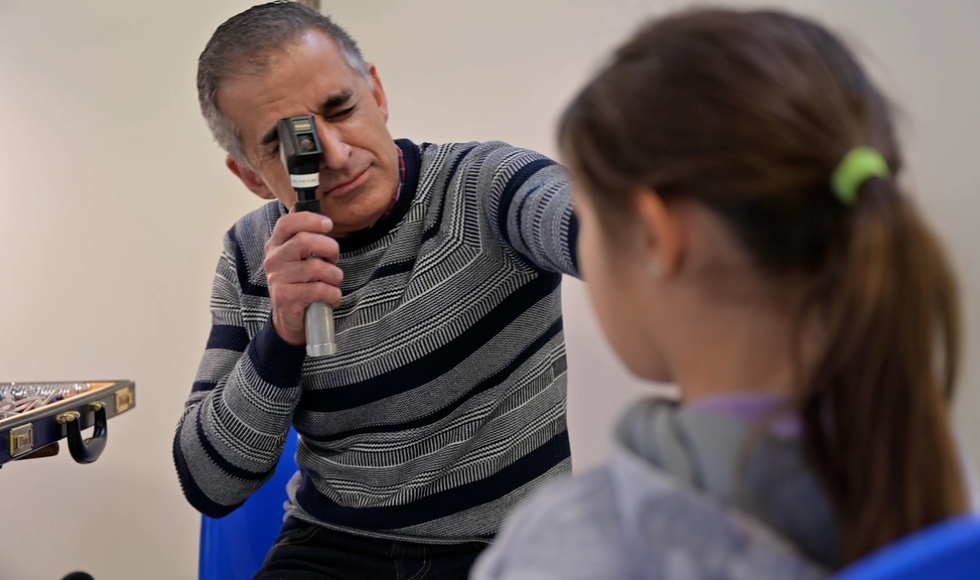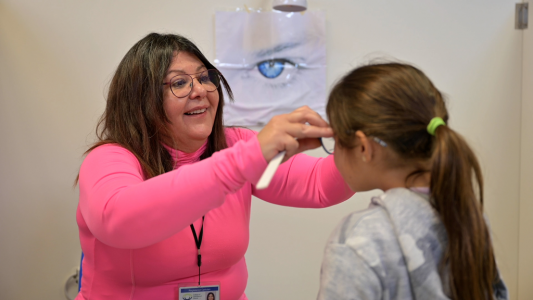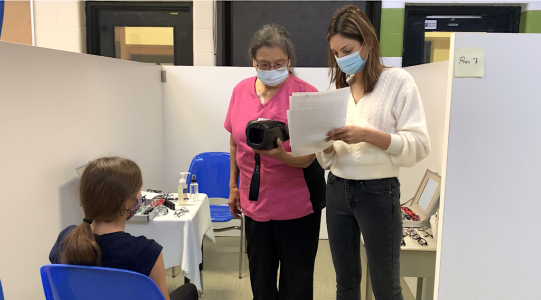Partnership brings eye care to Indigenous children in northern Ontario

Pediatric ophthalmologist Dr. Kourosh Sabri performing a refraction exam on a child in Moosonee.
BY Tina Depko, Faculty of Health Sciences
February 8, 2021
A partnership between McMaster University and the Weeneebayko Area Health Authority (WAHA) is helping improve eye care for Indigenous children in northern Ontario.
The Indigenous Children Eye Examination (ICEE) Project aims to provide vision screening and eye examinations for all children and youth aged six months to 18 years served by WAHA, and to develop a self-sustaining model of ensuring ongoing eye care for the pediatric population there.
“Normal vision is key for development in children, both physically and emotionally, as over 80 per cent of a child’s learning is based on vision,” said ICEE Project lead Dr. Kourosh Sabri, associate professor of surgery at McMaster and a pediatric ophthalmologist at McMaster Children’s Hospital.
“More than a third of Indigenous children have hyperopia, or farsightedness, which is more than three times higher than non-Indigenous children. Blindness is six times more likely. Undetected ocular disorders can lead to vision loss which can become permanent if not treated in time.”

The ICEE Project started in June 2020 and enables children in seven northern Ontario communities served by WAHA to connect with a team of eye specialists at McMaster once a week. The eye examinations are done virtually with the help of computer software developed at McMaster and the team at the nursing stations in the children’s local communities.
The communities participating in the ICEE Project include: Weenusk First Nation in Peawanuck, Fort Albany First Nation, Kashechewan First Nation, Attawapiskat First Nation, Moose Cree First Nation in Moose Factory, MoCreebec Eeyoud, and the Town of Moosonee.
Bruce Schimmens, clinical coordinator at Weeneebayko General Hospital, said, “Our health is so important, and our vision is essential to all that we do, and who we are. Too long the children of James Bay have gone without the routine care that every child in Canada has a right to.”
Dr. Elaine Innes, chief of staff at Weeneebayko Area Health Authority, said she has witnessed firsthand the benefit of this initiative, as her grandson participated in the first eye clinic.
“This is wonderful! The clinics will only improve from here. I was happy not to have to go all the way to Toronto to have my grandson seen,” said the physician.
To create a long-term system of care, the Hamilton-based team is also helping to train health-care staff in the remote northern communities on vision care. Among the ways this is being done is through the development of custom-made, online teaching modules to further streamline the training of local health workers.
“To create sustainability, local health-care workers are being trained to perform vision screening and eyeglass fittings on children,” said Sabri. “Once they have been trained to do this, most children examined who need follow-up will be able to be treated locally. This will begin the transition of the program into a self-sustaining, long-term model of care.”
Children who require more extensive eye care will be brought to McMaster Children’s Hospital in Hamilton for further evaluation and treatment, pending current COVID-19 best practices for travel.

Christine Faries, regional telemedicine coordinator at Weeneebayko Area Health Authority, said, “In general, the clinics are going well. Once the initiative fully takes off, it will provide a very good benefit to our families. Most people don’t want to travel out of region, especially with their children, if they don’t have to.”
The project is funded by Indigenous Services Canada for $1.7 million.
“Investing in the health and well-being of Indigenous children is of the utmost importance to our Government,” said MP Pam Damoff, Parliamentary Secretary to the Minster of Indigenous Services.
“The Indigenous Children Eye Examination (ICEE) program provides Indigenous children from communities served by Weeneebayko Area Health Authority access to necessary vision care that is not readily available to them in their communities. We must continue to work to ensure that Indigenous children have equal access to the services and care that they need.”
Meanwhile, Sabri and the ICEE team have developed a way to fill eyeglass prescriptions and send them to the children in the northern Ontario communities within days of the glasses being prescribed.
The WAHA and McMaster teams are confident that the results of the ICEE project can act as a major catalyst towards enabling other health-care providers to create a uniquely Indigenous-focused vision care program for the many other children in underserved parts of Canada.
“This model, once successfully implemented, can become a template for self-sustained, evidence-based health-care administration in many other rural communities within Canada and around the world,” said Sabri.
“Investing in children is investing in our collective future. We absolutely owe it to the children to open their eyes.”
Learn more about ICEE Project at www.iceenow.ca.


